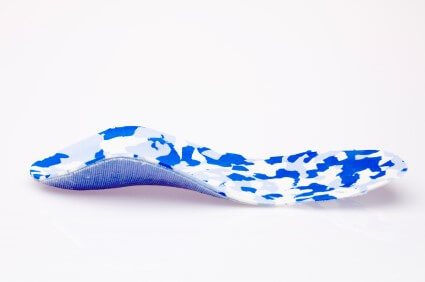Stuart (772) 223-8313Rate Us
Jupiter (561) 744-6683Rate Us
Stuart (772) 223-8313Rate Us
Jupiter (561) 744-6683Rate Us
 What Are Orthotics?
What Are Orthotics?
Orthotics are custom made devices manufactured from many types of materials. They fit inside your own shoes, and are worn on a full time basis. Orthotics help to control the way your foot functions. There are many types of orthotic devices. Advances in technology enable your podiatrist to prescribe a device specific to the activities that you participate in the most. From walking to running, or aerobics to basketball, orthotics can help you perform at peak efficiency. Professional orthotics are made from impressions of your feet. The devices are custom made for your feet only. Just as contact lenses or glasses improve vision, orthotics will help your podiatrist improve your foot function.
Biomechanical Orthotics:
Biomechanics involves the study of the body in motion. Biomechanical orthotics are prescription inserts made from neutral foot position casts. The prescribing practitioner sends the casts and clinical information to a professional orthotics laboratory, where an evaluation specialist reviews the casts and prescription. A staff doctor oversees the evaluation in the form of a “second opinion.” Then a production clinician takes responsibility for fabrication and quality control of the individual prescription. The fabricated orthotics are sent to the doctor to dispense with instructions to the patient. Orthotic treatment may be combined with other forms of treatment, such as injections, mediations, physical therapy or surgery.
Is There More Than One Type Of Orthotic?
Because we are born with different foot types, and because we engage in different occupations and activities, there are specific types of orthotics for individual patients. Orthotics may be used with children, adults, athletes, elderly patients and, very often, with patients following surgery or injury. Orthotics may be rigid, semi-rigid or soft (flexible).
How Long Will I Need To Wear Orthotics, and How Long Will They Last?
Orthotics may require a gradual breakin period. They are worn in 95% of all walking or standing activities. You will probably need to wear orthotics indefinitely, depending on how your foot function responds. Orthotics have a variable life span, depending upon your activities. You may need periodic changes in your prescription as your foot function changes.
Will I Need More Than One Pair of Orthotics?
There are patients who may need one pair for work and one pair for recreation. Women who wear different heel heights may require an additional pair. Your podiatrist may recommend more than one pair, depending on your individual need.
Rigid Orthotics:
This type of orthotic offers maximum functional control (controls the foot while in motion, not just standing). It is often made from plastic or some other type of rigid material. This is an excellent orthotic for the growing child, where stabilization of gait, support and maintain proper growth alignment is so important. This type of orthotic is often used to treat foot and leg pain, back pain, leg length differences and abnormal foot function.
Semi-Rigid Orthotics:
This type of orthotic combines foot protection and control of leg and foot function. This is often used as a sports orthotic to maximize athletic performance while protecting the athlete from stress-related sports injuries. A combination of different materials, allowing for functional and control and shock absorption, is used to fabricate orthotics for different sports, such as golf, tennis, basketball, baseball, football, jogging, aerobics, dancing, etc. dress shoe orthotics for female patients are considered semi-rigid orthotics. They are designed to control foot function in shoes that will not accommodate full size orthotics.
Soft (Flexible) Orthotics:
This type of orthotic maximizes shock absorption for the patient who may have lost the normal fat pad cushioning of the foot. Since this condition produces painful pressure areas, the soft orthotic is used as a replacement for the body’s natural loss of a protective fat pad. This orthotic type is helpful for diabetics, arthritics, and patients with severely deformed feet. These orthotics are also strongly indicated for the geriatric patient.
Your podiatrist will determine your special need for orthotics by careful evaluation. This valuation includes a medical history, as foot health is commonly related to general health. It will usually include x-ray evaluation, as foot problems often have an underlying bone problem. A thorough physical examination will be conducted to evaluate back, hip, leg, knee, ankle, and foot problems. Your doctor will evaluate your specific walking pattern. Gait analysis testing may be performed. Laboratory tests may be needed to diagnose your foot problems.
Once this information has been collected, your podiatrist will evaluate your specific case. Evaluation must include: the patient’s age; activity, including work and recreation habits; anatomy, including bone structure, joint motion, foot type (flat foot, high arch etc.), muscle tone (the ability of the muscle to contract and relax); foot gear (type of shoes worn) and the specific type of orthotic to be used by the patient.
A Word About Shoes:
When purchasing new shoes, try them on with orthotics. The style and last of the shoe, fitted to your feet with the orthotics, should be comfortable. You should be fitted individually, each time you purchase shoes, because different manufacturer’s sizes vary.